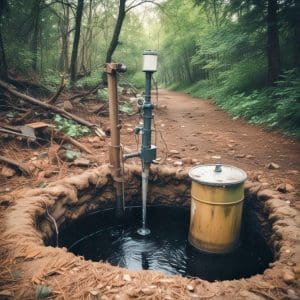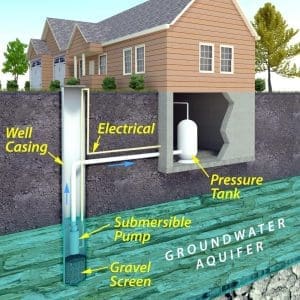 Approximately 45 million people in the United States depend on private water wells. Yet, many are unaware of the potential contaminants, including common waterborne pathogens, that can affect their groundwater sources and pose environmental health concerns. Common pollutants include bacteria, heavy metals, and various chemicals that can lead to health issues, highlighting that drinking water quality varies due to water pollution and contaminants. It is essential to conduct regular testing and use information to ensure safe drinking water from private wells and domestic well systems.
Approximately 45 million people in the United States depend on private water wells. Yet, many are unaware of the potential contaminants, including common waterborne pathogens, that can affect their groundwater sources and pose environmental health concerns. Common pollutants include bacteria, heavy metals, and various chemicals that can lead to health issues, highlighting that drinking water quality varies due to water pollution and contaminants. It is essential to conduct regular testing and use information to ensure safe drinking water from private wells and domestic well systems.
By recognizing these risks, well owners can take necessary precautions against groundwater contaminants to comply with the federal Safe Drinking Water Act and protect public water systems. This article will explore the most prevalent contaminants found in water wells, their origins, and effective ways to use information to reduce their impact. Staying informed about domestic well systems is key to protecting your family’s water quality.
Key Takeaways
- To ensure safety, regularly test your well water for common contaminants like bacteria, nitrates, and heavy metals.
- Understand the sources of these contaminants, such as agricultural runoff and industrial waste, to better protect your domestic well systems and water supply.
- Be aware of the health risks of contaminated well water, including gastrointestinal issues and long-term health effects.
- Utilize reliable detection methods, such as home testing kits or professional lab services, to identify potential issues quickly, including common well water contaminants, public water systems, groundwater, and well water lead. Better yet, let Grove & Son Well Service & Repair experts test your water for you!
- Implement removal strategies, such as filtration systems or UV treatment, to ensure clean drinking water for you and your family.
- Stay informed about local regulations and best practices for healthy maintenance to prevent water contaminants, safeguard your health, and ensure drinking water services from groundwater.
Common Contaminants in Water Wells
Bacteria and Viruses
Sewage and animal waste are common sources of bacteria and viruses in water wells. These common well water contaminants can cause gastrointestinal illnesses, leading to severe health problems related to groundwater and drinking water services. Regular testing for microbial contamination is crucial. This ensures that well water remains safe for consumption.
Chemical Pollutants
 Nitrates and nitrites are common chemical pollutants found in contaminated well water. They often enter through fertilizers and agricultural runoff. Exposure to these chemicals can lead to serious health risks, including methemoglobinemia, especially in infants. Monitoring chemical levels helps maintain well water quality.
Nitrates and nitrites are common chemical pollutants found in contaminated well water. They often enter through fertilizers and agricultural runoff. Exposure to these chemicals can lead to serious health risks, including methemoglobinemia, especially in infants. Monitoring chemical levels helps maintain well water quality.
Heavy Metals
Mining operations and household plumbing can introduce heavy metals into groundwater. Lead, arsenic, and mercury are examples of these harmful substances. Over time, they can cause toxicity and organ damage. Regular monitoring of heavy metal levels in private wells is essential for safety.
Organic Compounds
Agricultural practices and industrial activities release organic compounds into the environment. These pollutants can impact various body systems, including the liver and kidneys. Identifying and mitigating these organic contaminants is vital for protecting public health.
Sources of Contaminants
Natural Sources
Natural mineral deposits can introduce potential contaminants into water wells. Elements like arsenic and lead can leach from surrounding rocks and soils. Radionuclides, which are radioactive elements, may also be present. Exposure to these can pose health risks, including cancer. Geological surveys help identify these natural contaminants. They assess the area’s geology to pinpoint potential sources.
Agricultural Runoff
Fertilizers and pesticides are primary contaminants from agricultural activities. Rain or irrigation can wash these chemicals into nearby water sources, significantly affecting water quality in wells. Farmers can adopt practices like buffer zones and proper application techniques to manage this. These strategies help reduce the amount of runoff entering water supplies.
Industrial Discharges
Industries such as refineries and manufacturers contribute to water contamination. Their waste often contains harmful chemicals that seep into groundwater. This process leads to contaminated water consumption for nearby residents. Regulatory measures exist to control industrial pollution. These include permits and regular inspections to ensure compliance.
Household Waste
Common household products can also pollute water sources. Items like cleaning agents and medications often end up in landfills or drains. Improper disposal of these chemicals can negatively impact wells. Safe disposal practices, such as using designated collection sites, are essential. They help prevent harmful substances from reaching groundwater.
Health Risks and Impacts
Short-term Effects
Contaminated water can cause immediate health symptoms, such as nausea, vomiting, and diarrhea. These symptoms often arise from waterborne illnesses like infections. Acute gastrointestinal issues can lead to dehydration and other serious problems. Addressing contamination quickly is crucial to prevent these short-term effects.
Long-term Health Risks
Prolonged exposure to contaminated water poses significant health risks. Chronic conditions may develop over time. Some contaminants are linked to cancer or organ damage. For instance, heavy metals like lead can harm the kidneys and nervous system. Regular testing and long-term water quality management are essential for reducing these health risks.
Vulnerable Populations
Certain groups face greater risks from contaminated water. Infants and pregnant women are particularly vulnerable. Contaminants can affect fetal development or worsen existing health issues in infants. The impact on these populations highlights the need for targeted protection measures. Ensuring safe drinking water is vital for their health and well-being.
Detection and Testing Methods
Water Testing Kits
Home testing kits can detect various contaminants, including bacteria, nitrates, and heavy metals. They are simple to use and provide quick results. However, they may not identify all pollutants, so users should know their limitations. Regularly using these kits helps in the early detection of water quality issues. Better yet, let Grove & Son Well Service & Repair experts test your water for you!
Take advantage of our Well Inspection Offer

Laboratory Analysis
Laboratory testing offers a more comprehensive analysis of water samples. Labs can detect a wider range of contaminants compared to home kits. The accuracy of lab results is generally high. Professionals use advanced equipment for precise measurements. In severe cases, sending samples for lab analysis is crucial. This ensures reliable results that guide necessary actions.
Regular Monitoring
Consistent monitoring of water quality is essential. Setting up a schedule for routine testing helps catch problems early. Checking water regularly prevents potential health risks associated with contaminated water. Homeowners should aim for at least annual tests. This proactive approach protects health and ensures safe drinking water.
Removal and Prevention Strategies
Filtration Systems
 Different types of filtration systems exist for water wells. Common options include activated carbon filters, reverse osmosis systems, and sediment filters. Activated carbon filters effectively remove chlorine, volatile organic compounds, and bad odors. Reverse osmosis systems eliminate a wider range of contaminants, including heavy metals and salts. Sediment filters focus on removing dirt and sand particles. Choosing the right system depends on specific well issues. Testing water quality helps determine which contaminants are present.
Different types of filtration systems exist for water wells. Common options include activated carbon filters, reverse osmosis systems, and sediment filters. Activated carbon filters effectively remove chlorine, volatile organic compounds, and bad odors. Reverse osmosis systems eliminate a wider range of contaminants, including heavy metals and salts. Sediment filters focus on removing dirt and sand particles. Choosing the right system depends on specific well issues. Testing water quality helps determine which contaminants are present.
Disinfection Techniques
Disinfection is crucial for safe drinking water. Methods like chlorination and UV treatment are popular choices. Chlorination kills bacteria and viruses effectively but may leave chemical residues. UV treatment uses ultraviolet light to destroy microorganisms without adding chemicals. Both techniques are effective against pathogens. Proper disinfection is vital for maintaining water safety. Regular monitoring ensures these methods work effectively over time.
Regular Maintenance
Routine inspection and upkeep of wells are essential for preventing contamination. Inspecting the wellhead and surrounding area helps identify potential issues early. Cleaning components like screens and pumps prevents buildup that can lead to contamination. Repairing any leaks or damages keeps the well functional and safe. Regular maintenance extends the life of the well and protects water quality. Keeping records of inspections can help track changes over time.
Final Thoughts
Understanding common contaminants in water wells is crucial for your health and safety. You’ve learned about sources, health risks, and effective testing methods. Implementing removal and prevention strategies can significantly improve your water quality.
Stay vigilant and proactive about your well water. Regular testing and maintenance are key to ensuring safe drinking water for you and your family. Don’t wait for problems to arise; take action now to protect your health. Explore local resources for testing services and consider installing filtration systems if necessary. Your well-being depends on it!
Frequently Asked Questions
What are common contaminants found in water wells?
Common contaminants include bacteria, nitrates, heavy metals, and pesticides. These substances can enter the water supply through agricultural runoff, industrial discharges, and improper waste disposal.
How can I test my well water for contaminants?
You can test your well water using home testing kits or sending samples to certified laboratories. Regular testing helps ensure your water is safe for consumption.
What health risks are associated with contaminated well water?
Contaminated well water can cause various health issues, including gastrointestinal illnesses, neurological problems, and long-term diseases like cancer. Protecting your water quality is crucial for overall health.
How often should I test my well water?
It’s recommended to test your well water at least once a year. More frequent testing may be necessary if you notice changes in taste, odor, or appearance.
What are some effective removal strategies for contaminants?
Effective removal strategies include filtration systems, reverse osmosis, and UV disinfection. Select a method based on the specific contaminants present in your water.
Can I prevent contamination in my well water?
You can prevent contamination by maintaining proper distance from septic systems, using safe agricultural practices, and regularly inspecting your well for damage or leaks.
Is it safe to drink untreated well water?
Untreated well water may pose health risks due to potential contaminants. Always test and treat your water before consumption to ensure safety and protect your family’s health.


0 Comments